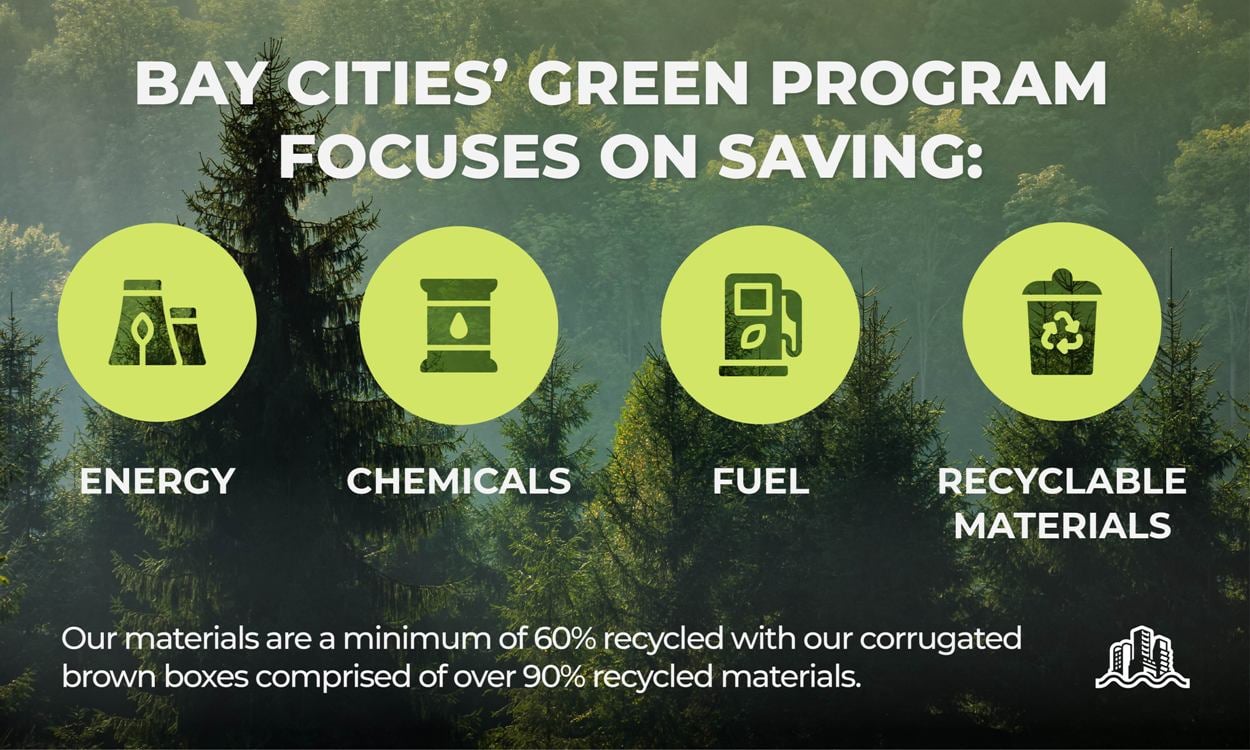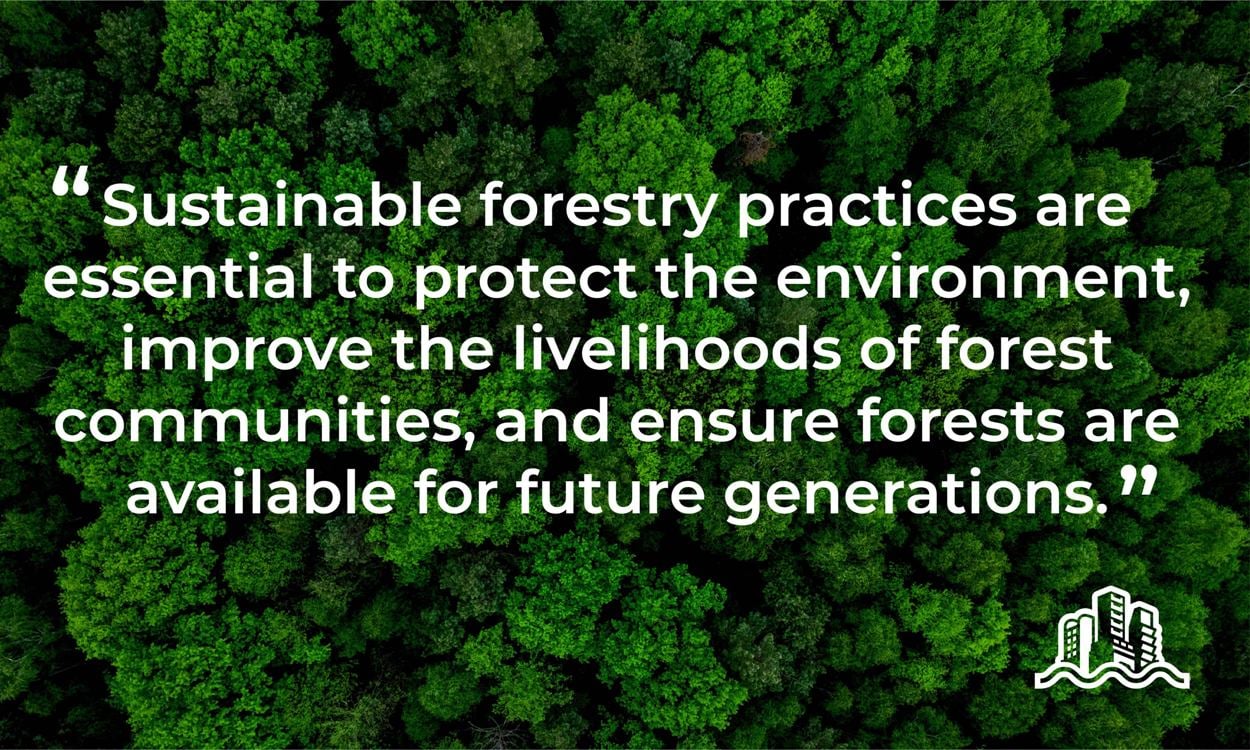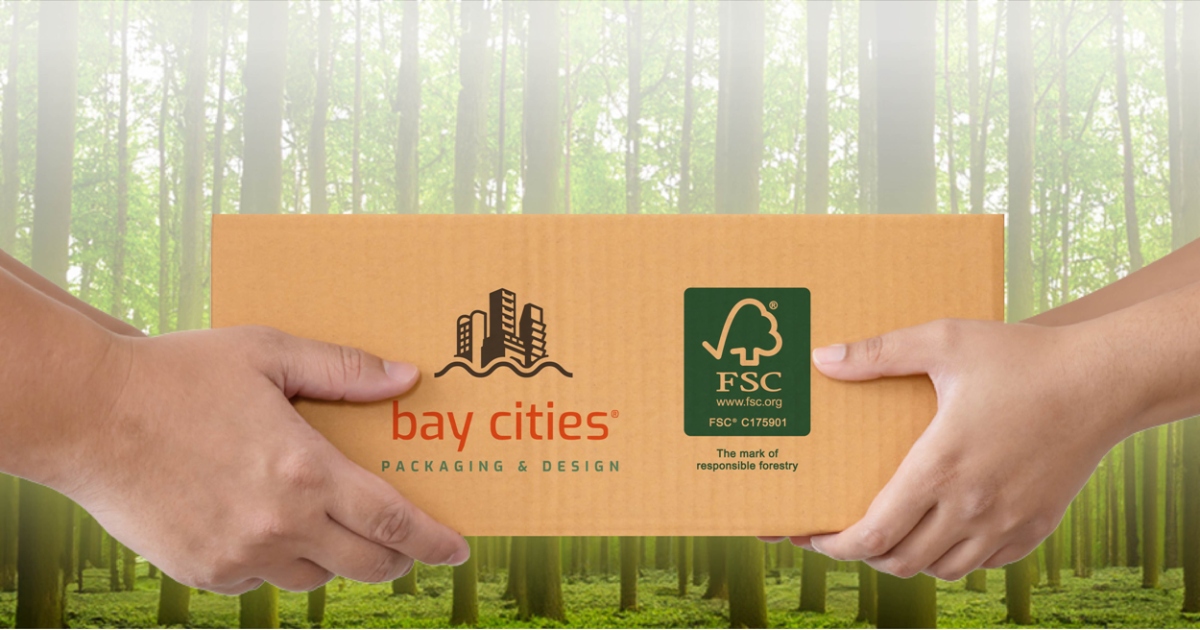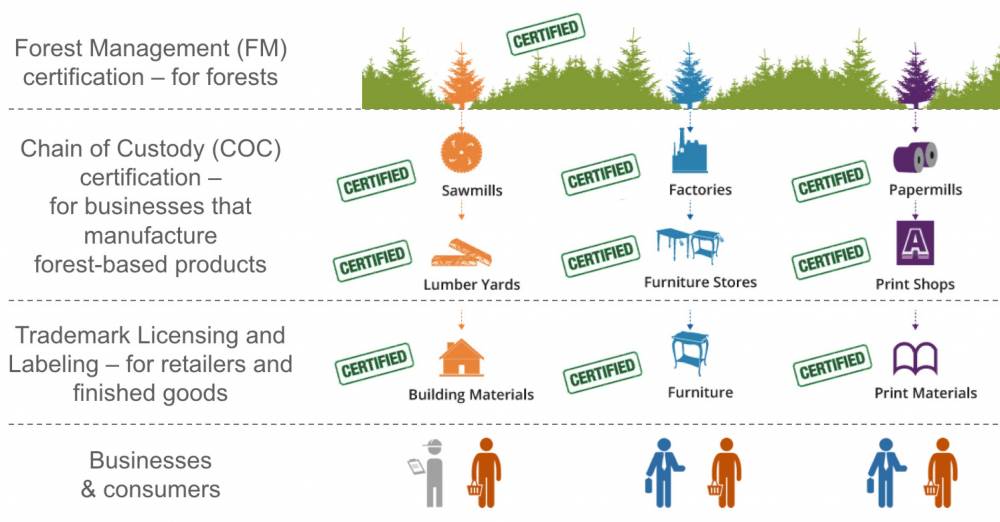Forests cover roughly 31% of the Earth’s land surface and are an important part of our daily lives. Not only do they provide oxygen, clean water, and habitat for wildlife, but they are also key for the pulp and paper industry. To encourage responsible forestry, the Forest Stewardship Council (FSC®) was created, a voluntary certification program for sustainable forestry.
This is the world's most widely recognized forest credential standard and ensures that wood products come from forests that are managed sustainably.
As part of the pulp and paper industry with a reliance on forests, Bay Cities is committed to using sustainably sourced products, which is why we made our FSC® certification a priority.
But what exactly does it mean to be FSC® Certified?
What is FSC® Certification?
The FSC® system is a proven, impactful method to prevent deforestation, preserve biodiversity, and protect human rights. An FSC® certification guarantees wood and paper products come from forests that are managed sustainably according to specific standards. Founded in 1993 to promote responsible management of the world's forests, approximately 159 million hectares worldwide (or 392 acres) have obtained FSC® certification as of June 2023.
In addition to certifying forests, the FSC® provides guidelines for responsible forest management in three main areas: environmental protection, social fairness, and economic viability.
You’ll recognize FSC®-certified products by spotting one of their three labels.
Protip: To verify the authenticity of a product's FSC® certification, look for the FSC® logo, a tree with a check mark. The logo should be accompanied by a certification code, usually starting with "FSC®-."
Bay Cities Use of the FSC® Certification
FSC® standards are a crucial component of Bay Cities’ sustainability strategy. We are committed to using FSC®-certified wood in all our paper products. Through the Bay Cities Green Program, we continue to increase efficiencies while reducing waste. This includes promoting proactive environmental practices, cost reduction, and employee efficiency, in addition to paying attention to energy, chemicals, fuel, and other materials we use regularly.

Bay Cities also holds an additional sustainability certification with Sustainable Forestry Initiative® (SFI®), which recognizes efforts toward responsible forest management practices.
We are also a member of the Sustainable Packaging Coalition (SPC), an organization that believes in advancing sustainable packaging initiatives, and have joined the Paper & Packaging Board's Box to Nature campaign that encourages recycling in residential areas.
How is a FSC® Certification Obtained
Companies along the supply chain that take legal ownership of FSC®-certified products, and wish to make an FSC® claim through sales and delivery or label products with the FSC® label, must also be Chain of Custody certified.
Chain of Custody (CoC) is the path forest products take from the beginning to the end consumer. It starts in the forest and follows the supply chain through processing, manufacturing, and distribution. FSC®-certified companies are audited to the Chain of Custody standard, so when an FSC® label is on a finished product, the materials used during production have met their requirements throughout every step of production.
To qualify for a chain of custody certification, your organization must implement a management system that ensures the following:
- Forest-based materials used in part or all of production are FSC®-certified. This includes reclaimed materials.
- FSC®-certified material is identified and tracked during the manufacturing and distribution processes.
- All documents and records relating to FSC®-certified product production, purchase, and sales are kept.
- You must also meet FSC®'s core labor requirements, including:
- FSC® core labor requirements must be met, including:
- No child or forced labor
- No discrimination in employment and occupation
- Freedom of association and the right to collective bargaining
Image source as: https://us.fsc.org/en-us/certification/chain-of-custody-certification
Benefits of FSC® Certification for Businesses
By earning FSC® certification, businesses can demonstrate to customers and employees that their business practices align with their values.
Businesses committed to environmental sustainability are more likely to be granted licenses or permits by the government. FSC® certification has helped legitimize companies by showing their dedication to responsible forestry practices.
This certification also benefits businesses in different ways, including:
- Credibility: FSC® certification demonstrates to consumers, investors, and other stakeholders that a company is committed to responsible forest management.
- Environmental protection: Products certified by FSC® standards make wood that protects the environment when harvested. This can help businesses reduce their environmental impact and comply with environmental regulations.
- Community engagement: FSC® certification requires businesses to engage with local communities and protect indigenous people's customary rights. This can help companies build relationships with local communities and gain support.
- Access to markets: Many major companies, green building standards, and governments have policies that favor FSC®-certified products. This means that FSC®-certified businesses can access a broader range of markets.
- Branding and marketing: It helps companies to differentiate their products from their competitors and appeal to consumers concerned about the environment.

The Importance of Sustainable Forestry Practices
Sustainable forestry practices are essential to protect the environment, improve the livelihoods of forest communities, and ensure forests are available for future generations.
Additionally, sustainable forestry practices play an important role for humans in a variety of ways:
- Mitigating climate change: Forests play a vital role in mitigating climate change by absorbing atmospheric carbon dioxide. When managed sustainably, forests can continue to absorb carbon dioxide and help slow the pace of climate change.
- Protecting water quality: Forests help to protect water quality by filtering runoff from rainwater and snowmelt. This helps to prevent pollution from entering rivers, lakes, and streams.
- Providing habitat for wildlife: Forests provide habitat for a wide variety of wildlife, including many threatened or endangered species. Sustainable forestry practices can help protect wildlife habitats and ensure these species have a place to live.
- Supplying jobs and income: Forests employ millions of people around the world. Sustainable forestry practices can help to create and maintain these jobs and can also help to boost the economies of local communities.
- Ensuring food security: Forests provide food for people in many parts of the world. Sustainable forestry practices can ensure these food sources are available for future generations.
For Bay Cities, the FSC® certification guarantees products are made from responsibly sourced materials while helping preserve forests for future generations. We believe the FSC® standard has helped our business grow and thrive, and we hope it will continue in the years ahead.
Contact us today to learn more about our sustainability practices and how they can benefit your next packaging or display project.




/BC_Logo2_White.png?width=300&height=83&name=BC_Logo2_White.png)